When I first started learning Norwegian, I was all about being the perfect, polite language student. I drilled my “takk så mye” and “unnskyld meg” like my life depended on it. Then I watched my first Norwegian film...and boom! Suddenly, people were saying words that ABSOLUTELY weren’t in my beginner’s textbook.
That’s when I realized that learning a language goes beyond what’s in my textbooks. Actual “learning” means understanding how people talk when frustrated, surprised, or being themselves.
So while Norwegian curse words and insults might skip your typical language course, they’re everywhere in conversations. And when things like that are spoken all the time, it only makes sense to learn them as well!
So in this post, I’ll share 12+ Norwegian curse words and insults that’ll help you understand what’s being said around you, plus some tips on how to recognize them when you hear them in the wild.
- 14+ Russian Swear Words & Insults You Need To Know
- 18+ Crazy Dutch Swear Words And Insults
- 12+ Japanese Curse Words & Swear Words (With Context)

Do Norwegians Swear?
Yes, Norwegians swear frequently and with much less cultural taboo than many other countries. Nordic people have a laissez-faire attitude towards swearing, and to many, swearing is an integral part of their everyday language. However, note that swearing frequency and acceptance vary by region within Norway.
For instance, people from Northern Norway, in particular, are known for swearing in public, where terms like "hestkuk" (horse cock) are so normalized that court rulings have deemed them acceptable in daily conversation. Meanwhile, Southern Norway, sometimes called the Bible belt, maintains stricter attitudes toward profanity.
Knowing these words helps you follow movies, shows, and everyday chats, especially when Norwegians get frustrated, surprised, or want to make a point.
Norwegian Curse Words And Insults
Helvete
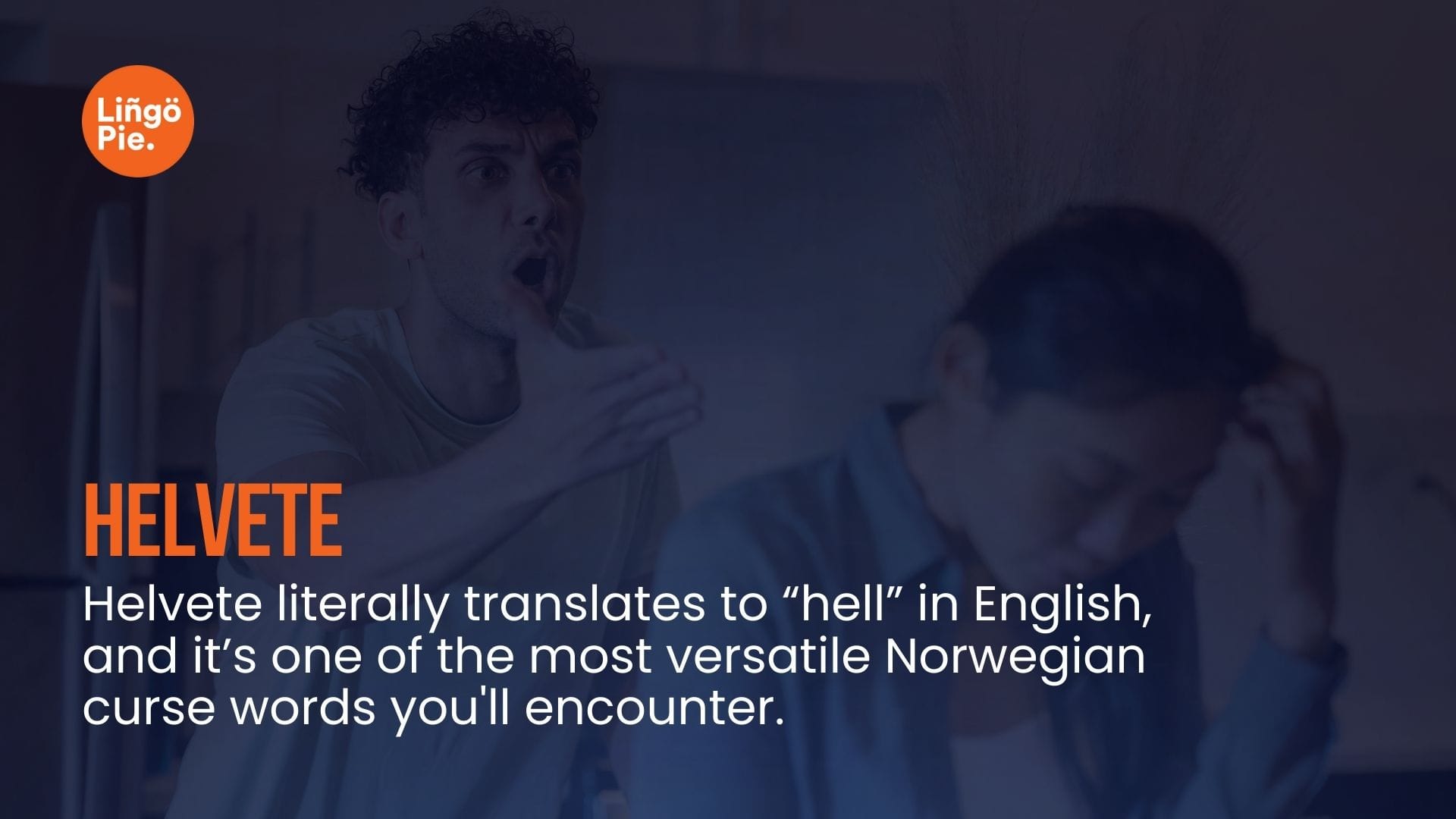
Helvete literally translates to “hell” in English, and it’s one of the most versatile Norwegian curse words you'll encounter. When something goes wrong, like spilling coffee on your laptop or missing your bus, Norwegians will often blurt out "Helvete!" as a standalone exclamation of frustration.
You can also use it in its literal sense, telling someone to "Dra til helvete" (go to hell) or mixed with other curses like “faen i helvete” (fucking hell) to crank up the intensity.
Faen
Faen is a contraction of "fanden," which means "the devil," but in everyday use, it functions much like "fuck" or "damn" in English. You can use faen as a standalone exclamation when you're frustrated ("Faen!"), direct it at someone ("Faen ta deg!" meaning "fuck you" or literally "devil take you"), or use it as an intensifier in longer phrases.
Unlike its literal meaning, most Norwegians aren't thinking about the devil when they say it; it's simply become the go-to word for emotional emphasis.
Dritt
Dritt is the Norwegian equivalent of "shit," and like its English counterpart, it's both literal and metaphorical. In its most basic form, dritt refers to actual excrement, but Norwegians use it far more creatively in everyday speech. You can describe something disappointing or of poor quality as "det er dritt" (that's shit), or express frustration with a simple "dritt!" when things go wrong.
Dritt can become even more interesting when combined with other terms. For instance, the word "drittsekk" literally means "shit bag" but translates to "scumbag" or "asshole" when used as an insult.
Søren
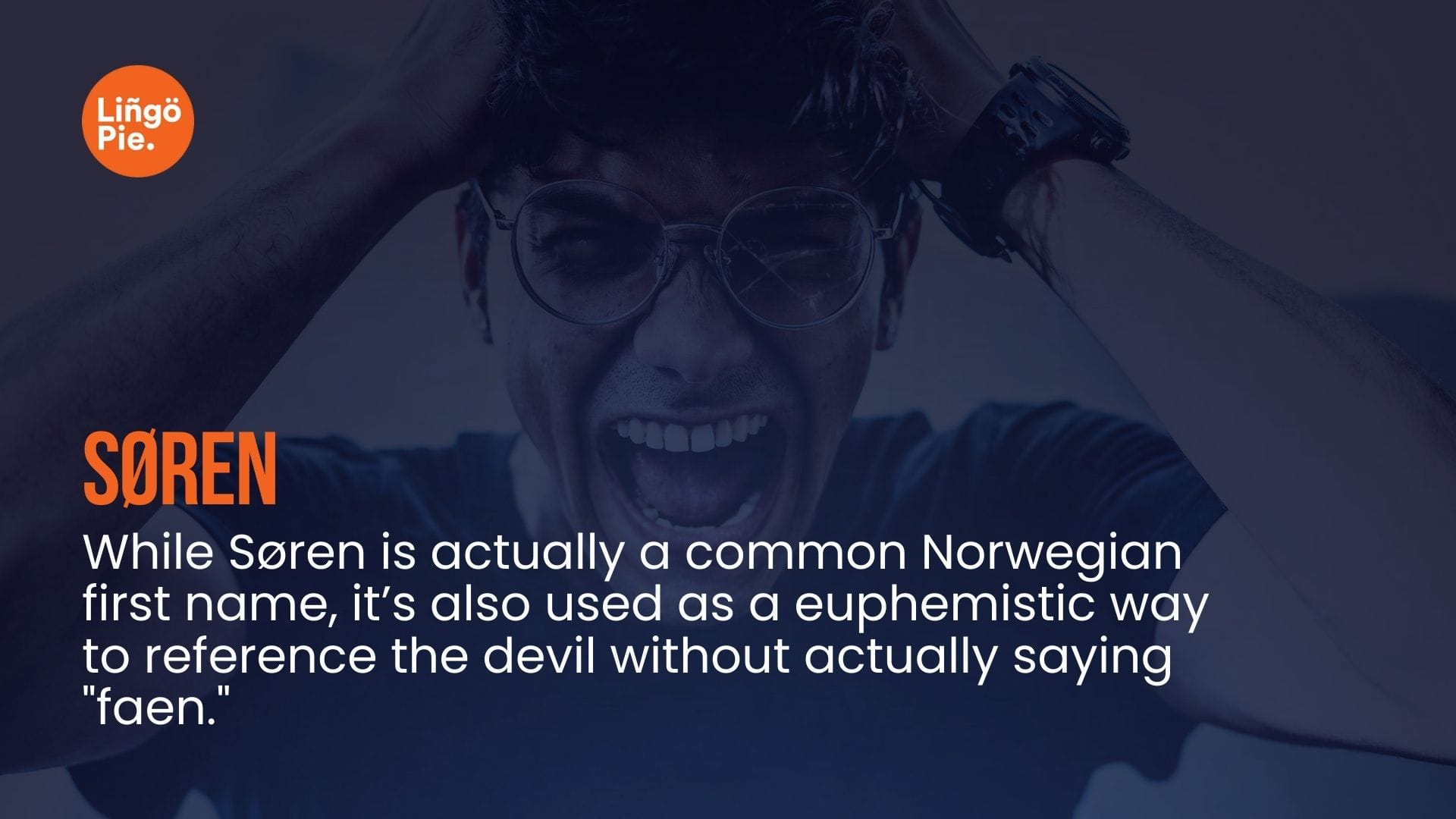
While Søren is actually a common Norwegian first name, it’s also used as a euphemistic way to reference the devil without actually saying "faen." When Norwegians want to express frustration but keep things family-friendly, they might say "Fy søren!" instead of "Fy faen!" The literal translation would be something like "Fie, Søren!" but functionally it means the same as "damn it!"
Kuk
Kuk is the Norwegian word for "penis" or "dick," and it's used both literally and as an insult. When Norwegians want to call someone a dick (meaning they're being unpleasant or stupid), they'll use "kuk" in much the same way English speakers do. You can also use it with other words to make even more rebellious terms like "hestkuk" (horse cock) or "kuksuger" (cocksucker).
Pokker
Pokker literally refers to "smallpox," making it one of the more historically rooted Norwegian curse words. When someone says "Pokker ta deg!" they’re essentially saying "may smallpox take you!”—which sounds medieval but functions like a mild "damn you!" in modern usage.
You can use "pokker" as a standalone exclamation when you're mildly frustrated, similar to saying "darn it!" in English. The good thing about this is that this word has an old-fashioned feel to it that makes it sound less harsh than faen or helvete.
Jævlig / Jævla/ Jævel
This trio of related words all stem from "jævel," meaning "devil" or "bastard," but they function differently in Norwegian sentences. For instance, "Jævel" as a noun is a direct insult, like calling someone "din jævel" is saying "you bastard."
However, "jævlig" and "jævla" work as intensifying adjectives, similar to how English speakers use "fucking" to emphasize other words. You might hear "jævlig stor" (really big) or "jævla bil" (damn car), where the curse word amplifies whatever follows it.
Fitte
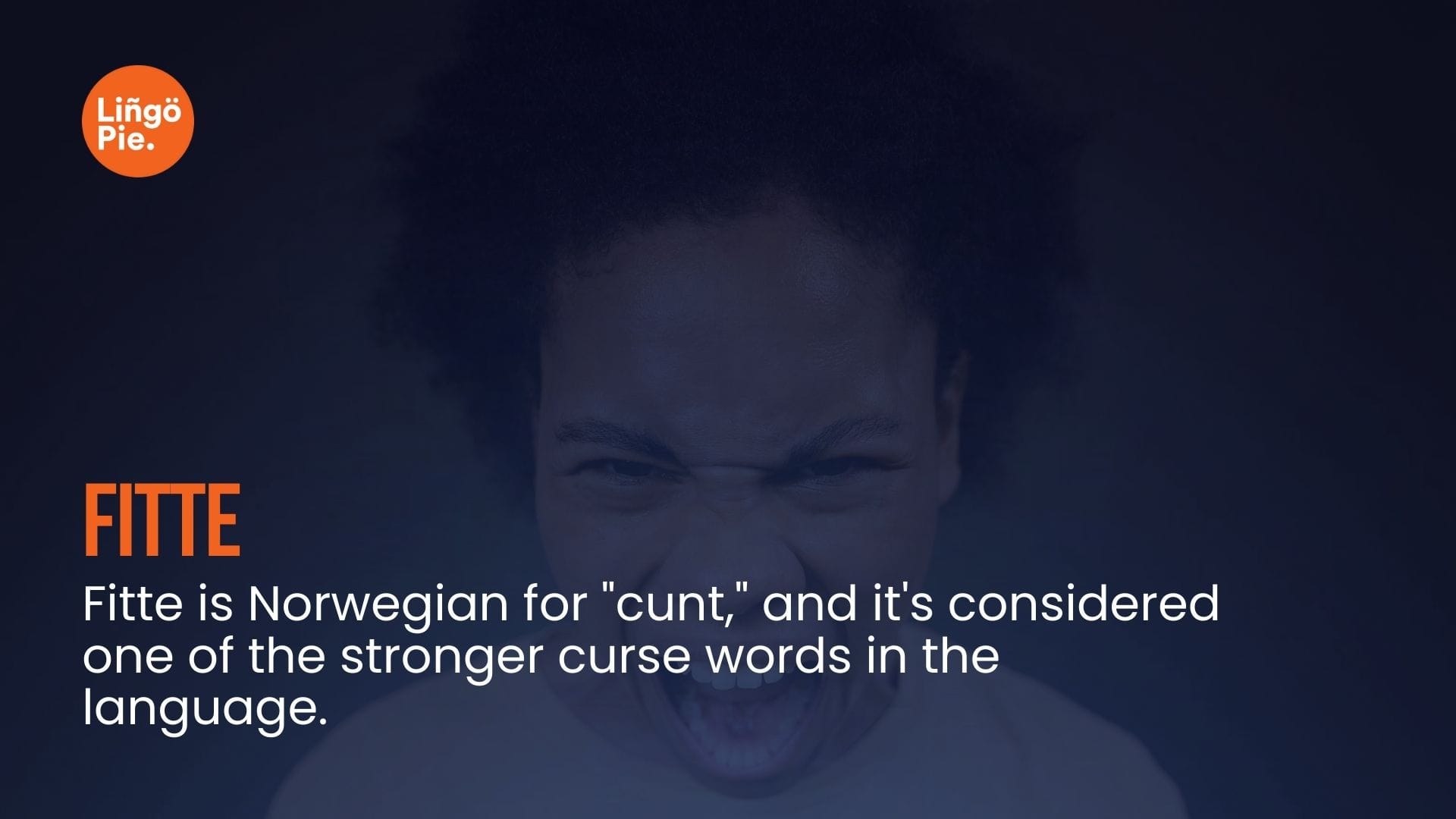
Fitte is Norwegian for "cunt," and it's considered one of the stronger curse words in the language. The word also appears in compound insults—"fittetryne" combines fitte with "tryne" (face) to create "cuntface," showing how Norwegian's compound word structure allows for creative profanity combinations.
It's crucial for learners to understand, though, that fitte is the heavier end of Norwegian swearing. Basically, fitte is reserved for moments of genuine anger or serious insult.
Drit og dra
"Drit og dra" literally translates to "shit and leave," but it functions as Norwegian's version of "fuck off" or "piss off." This phrase combines "drit" (shit) with "dra" (leave/go), creating a dismissive command that tells someone to go away in no uncertain terms. The phrase can also be shortened to just "dra!" (go!) in heated moments, but the full "drit og dra" adds extra punch through the inclusion of profanity.
Hold Kjeft
"Hold kjeft" literally translates to "shut up" or "keep your mouth shut," and it's one of the most direct ways to tell someone to stop talking. The word "kjeft" refers to the mouth or muzzle of an animal, so when you tell someone to "hold kjeft," you're essentially treating them like a barking dog that needs to be silenced.
You might hear it shortened to just "kjeft!" in heated arguments, or extended to "hold kjeften din!" (shut your mouth!) for extra emphasis. While not as profane as some Norwegian curse words, remember that "hold kjeft" is definitely rude and confrontational.
Bytting
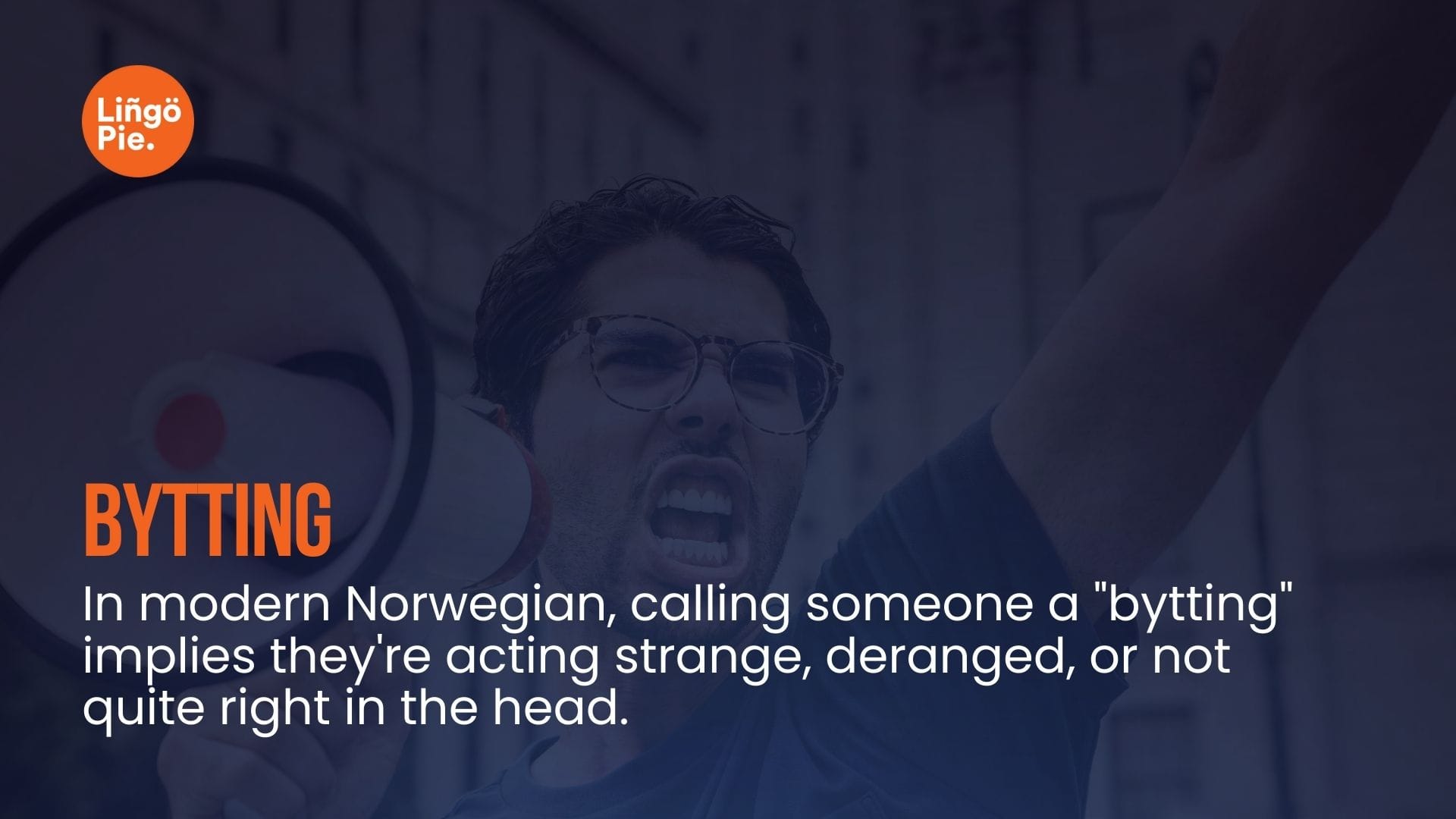
"Bytting" draws from Norwegian folklore and literally means "changeling." Basically, changeling refers to those mythical fairy or elf children that were supposedly swapped with human babies at birth according to European legends.
In modern Norwegian, calling someone a "bytting" implies they're acting strange, deranged, or not quite right in the head. It's essentially saying someone is behaving like they're not fully human, a complete idiot, or that something's wrong with them mentally.
Kjerring
"Kjerring" technically means "old woman" or "old wife," but its usage as an insult is far more complex and regionally dependent than most Norwegian curse words. In Northern and Eastern Norway, calling someone's wife "kjerring" might actually be considered neutral or even affectionate.
However, in other parts of Norway, "kjerring" carries the harsh connotation of "old hag" or "bitter old woman," making it a genuine insult. The word can be directed at women to suggest they're nagging, unpleasant, or acting older than their years.
Nabb
"Nabb" is Norwegian internet slang for "noob" or "n00b." Just like in English gaming culture, calling someone a "nabb" means they're inexperienced, clueless, or bad at whatever they're trying to do.
Kronidiot
"Kronidiot" literally translates to "crown idiot," positioning someone as the ultimate, supreme ruler of all idiots. This compound word combines "krone" (crown) with "idiot," suggesting that the person achieved such remarkable levels of stupidity that they deserve to be crowned as the king or queen of idiots.
Why Learn Norwegian Bad Words?
From a practical standpoint, knowing Norwegian bad words helps you develop complete listening comprehension skills and cultural awareness. You’ll finally understand what characters are actually saying in Norwegian crime dramas, catch the full meaning of heated discussions, and recognize when conversations are escalating—all essential skills for anyone serious about achieving fluency.
Additionally, understanding when someone is swearing at you can help you navigate potentially dangerous or uncomfortable situations more effectively. Since Norwegians use curse words more freely than many other cultures, especially in Northern Norway, not understanding this aspect of the language leaves you culturally and linguistically isolated from authentic Norwegian communication patterns.
Ready to Start Swearing Like a Norwegian?
And there we have our list! As you can see, Norwegian curse words might not be the most polite part of the language, but they're an undeniable piece of authentic Norwegian communication.
While Norwegian is coming soon to Lingopie, you can start building your curse word vocabulary in other languages right now. Why not sign up for a free trial and explore how Spanish speakers use "joder," how the French express frustration with "merde," or discover the creative insults Germans throw around?
Try Lingopie now!


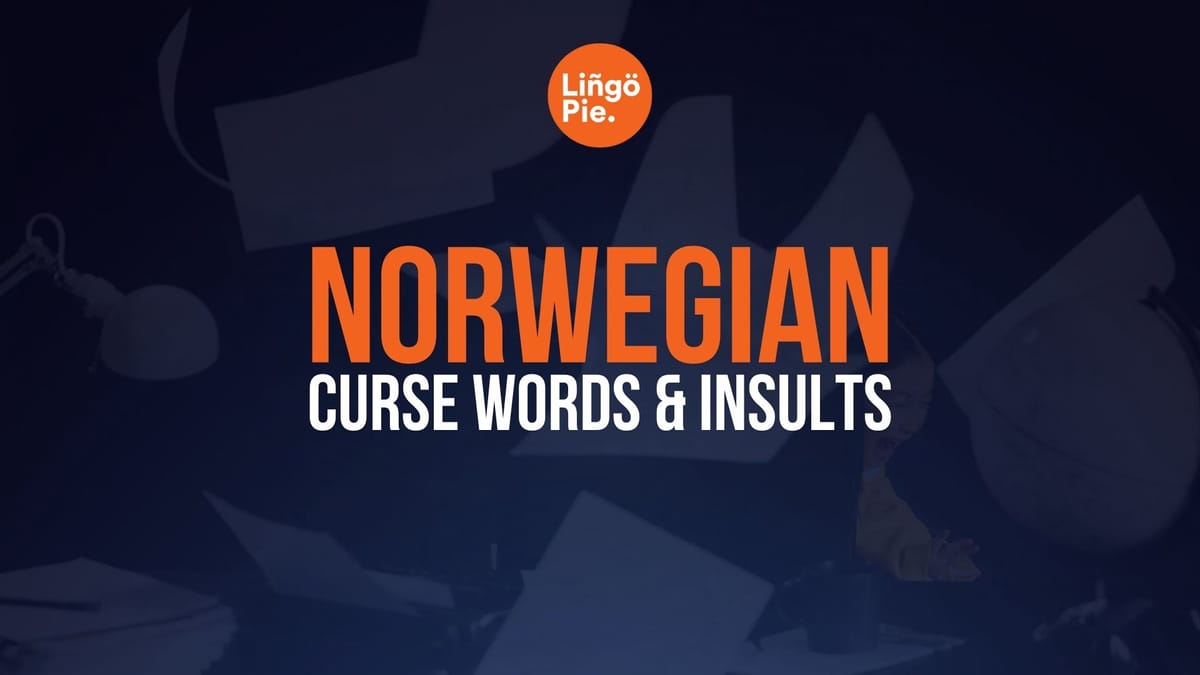

![Russian Instrumental Case: How To Use And Form One [Guide]](/blog/content/images/2025/08/Russian-Instrumental-Case.jpg)

![How To Learn Norwegian As A Beginner: Tips + Guide [2026]](/blog/content/images/size/w300/2025/07/Learn-norwegian-as-a-beginner.jpg)